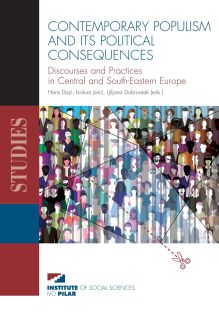U Biblioteci Studije Instituta Pilar objavljena je knjiga CONTEMPORARY POPULISM AND ITS POLITICAL CONSEQUENCES. Discourses and Practices in Central and South-Eastern Europe koju su uredili Haris Dajč, Isidora Jarić i Ljiljana Dobrovšak. Riječ je o radovima s istoimenog znanstveno-stručnog skupa održanog u Beogradu prosinca 2019. godine u organizaciji Filozofskog fakulteta Univerziteta u Beogradu, u okviru aktivnosti Horizon2020 projekta Populist rebellion against modernity in 21st-century Eastern Europe: neo-traditionalism and neo-feudalism (Poprebel). – Iz Predgovora
This book is the result of papers that were presented during the first conference organized within the scope of the Poprebel project – Populist rebellion against modernity in 21st-century Eastern Europe: neo-traditionalism and neo-feudalism. Poprebel is a Horizon 2020-funded research project that analyses the rise of populism in Central and Eastern Europe and is run by a consortium of six universities
CONTEMPORARY POPULISM AND ITS POLITICAL CONSEQUENCES. Discourses and Practices in Central and South-Eastern Europe
Haris Dajč, Isidora Jarić, Ljiljana Dobrovšak (eds.)
Bibliotheca Studies – Book 44
Institut društvenih znanosti Ivo Pilar
Zagreb 2022 – 320 pp
ISBN 978-953-8404-16-0
Contents
– Cover | Impressum | Contents
Haris Dajč: Introduction
I ECONOMY
Ljubomir Madžar: Socialist Legacies in the Contemporary Development of the Serbian Economy
Paulina Lenik: Market transformation under Fidesz – Energy and Banking Policy Review Since 2010
Ognjen Radonjić, Rosana Antoni Kotorchevikj: Theories on the Roots of the EU and the Western Balkans Rise of Populism
II POLITICS
Milivoj Bešlin, Petar Žarković: The Continuity of Populism in Serbia: From the 19th to the 21st century
Nikola Samardžić: Russia and Western Balkans 1999—2019. The Rise of Populism and Hybrid Warfare
Haris Dajč, Nataša Jovanović Ajzenhamer: The Populist Left and the Populist Right in the Contemporary Post-Yugoslav space: Socio-economic Programmes of Mainstream Parties in Serbia and Croatia
Alexander Mesarovich: Between a Rock and a Hard Place: Strategies of Political Cooperation in a Populist World
Branka Galić: Some Sociological Elements of Neoconservative Politics in Populist Movements of Croatian society
Aleksandar Weisner: Militarization, State Capture and Contaminated Society – Case Study Serbia
Marko Tmušić: Populism and its Implications on the Economic Growth Model in Serbia: What have we Learned so far?
III DISCOURSIVE PRACTICES
Isidora Jarić, Danica Balaban, Snežana Bajčeta: (Mis)Use of Unnamed Sources in Media Reporting on Political Actors: The Role of the Media in the Populist Construction of the Enemies of the People
Caroline Hill: “Gay Propaganda” and Morality Policy: Orthodox Framing in LGBT Rights Debates in Russia
Slobodanka Dekić: Negotiating Family: Family Politics and LGBTIQ organizations in Serbia
Olena Yermakova: Othering’ of LGBT movement as an Element of Contemporary Populist Discourse in Poland
Teodora Jovanović: Conceptual principles of Exclusion in Anti-migrant Rhetoric expanding in Serbia
Elodie Thevenin: Protecting Europe against Migration. Low and Justice’s Populist Discourse in the Polish Parliament
Péter Molnár, Gyula Balázs Csáki-Hatalovics: A Balance in the Force? The role of Social Media in the Hungarian Elections in 2019
Since early 2020, we experienced several waves of the Covid-19 pandemic that showed how incompetent populist and authoritarian leaders are despite their image of strongmen. And when one of the many waves of the Covid-19 pandemic seemed to lose strength, we witnessed a new full-scale war declared by Russia against Ukraine in February 2022. Since the war started, we have analyzed and read numerous articles and reports concerning the causes of the war – in particular, the diabolic speeches of the Russian president to his scared and silent audience at home. He has shown that he believes himself to be a historian and sees himself suitable for a messianic plan of rewriting history. He has omitted not only security guarantees that Russia gave to its neighbor Ukraine but to the international community, too (which he’s violated without much punishment in the last two decades)and has also shown that the time of Catherine the Great and Peter the Great belongs only to trained historians, and not to statesmen that believe themselves to be a messiah.
Haris Dajč

 Institut društvenih znanosti Ivo Pilar Pilar
Institut društvenih znanosti Ivo Pilar Pilar




